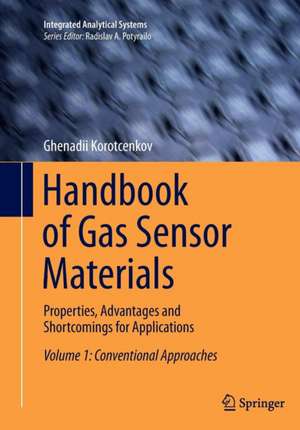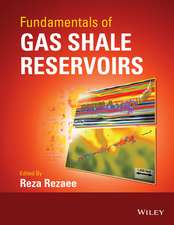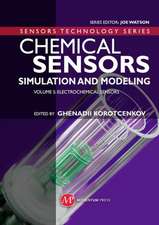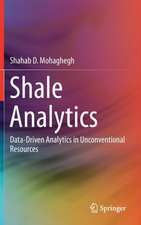Handbook of Gas Sensor Materials: Properties, Advantages and Shortcomings for Applications Volume 1: Conventional Approaches: Integrated Analytical Systems
Autor Ghenadii Korotcenkoven Limba Engleză Paperback – 23 aug 2016
| Toate formatele și edițiile | Preț | Express |
|---|---|---|
| Paperback (2) | 711.21 lei 6-8 săpt. | |
| Springer – 23 aug 2016 | 711.21 lei 6-8 săpt. | |
| Springer – 23 aug 2016 | 957.75 lei 6-8 săpt. | |
| Hardback (2) | 966.15 lei 6-8 săpt. | |
| Springer – 7 noi 2013 | 966.15 lei 6-8 săpt. | |
| Springer – 18 sep 2013 | 1237.61 lei 6-8 săpt. |
Din seria Integrated Analytical Systems
- 19%
 Preț: 588.66 lei
Preț: 588.66 lei - 18%
 Preț: 1229.40 lei
Preț: 1229.40 lei - 18%
 Preț: 954.45 lei
Preț: 954.45 lei - 15%
 Preț: 641.71 lei
Preț: 641.71 lei - 15%
 Preț: 638.43 lei
Preț: 638.43 lei - 15%
 Preț: 658.05 lei
Preț: 658.05 lei - 15%
 Preț: 651.99 lei
Preț: 651.99 lei - 18%
 Preț: 959.19 lei
Preț: 959.19 lei - 18%
 Preț: 966.15 lei
Preț: 966.15 lei - 18%
 Preț: 1007.65 lei
Preț: 1007.65 lei - 15%
 Preț: 698.80 lei
Preț: 698.80 lei - 18%
 Preț: 1393.09 lei
Preț: 1393.09 lei - 18%
 Preț: 725.71 lei
Preț: 725.71 lei - 15%
 Preț: 639.25 lei
Preț: 639.25 lei - 18%
 Preț: 1226.11 lei
Preț: 1226.11 lei
Preț: 957.75 lei
Preț vechi: 1167.99 lei
-18% Nou
Puncte Express: 1437
Preț estimativ în valută:
183.29€ • 199.02$ • 153.96£
183.29€ • 199.02$ • 153.96£
Carte tipărită la comandă
Livrare economică 23 aprilie-07 mai
Preluare comenzi: 021 569.72.76
Specificații
ISBN-13: 9781493944682
ISBN-10: 1493944681
Pagini: 461
Ilustrații: XIX, 442 p. 220 illus.
Dimensiuni: 178 x 254 x 24 mm
Greutate: 0.8 kg
Ediția:Softcover reprint of the original 1st ed. 2013
Editura: Springer
Colecția Springer
Seria Integrated Analytical Systems
Locul publicării:New York, NY, United States
ISBN-10: 1493944681
Pagini: 461
Ilustrații: XIX, 442 p. 220 illus.
Dimensiuni: 178 x 254 x 24 mm
Greutate: 0.8 kg
Ediția:Softcover reprint of the original 1st ed. 2013
Editura: Springer
Colecția Springer
Seria Integrated Analytical Systems
Locul publicării:New York, NY, United States
Cuprins
Conventional gas sensing materials.- Auxiliary materials.- Materials for specific gas sensors.- Nanostructured gas sensing materials.- Other trends in design of gas sensor materials.- Nanocomposites.- Stability of gas sensing materials and related processes.- Structure and surface modifications of gas sensing materials.- Technology and sensing material selection.
Notă biografică
Ghenadii Korotcenkov has more than 40 years experience as a teacher and scientific researcher. He received his Ph.D. in Physics and Technology of Semiconductor Materials and Devices in 1976, and his Habilitate Degree (Dr. Sci.) in Physics and Mathematics of Semiconductors and Dielectrics in 1990. For many years, he led the scientific Gas Sensor Group and managed various national and international scientific and engineering projects carried out in the Laboratory of Micro- and Optoelectronics, Technical University of Moldova. Since 2008, Korotcenkov has been a research Professor in Gwangju Institute of Science and Technology, Republic of Korea.
Korotcenkov’s research results are well-known in the study of Schottky barriers, MOS structures, native oxides, and photoreceivers on the base of III-Vs compounds. His current research interests include material sciences and surface science, focused on metal oxides and solid state gas sensor design.
Korotcenkov is the author or editor of sixteen books and special issues, twelve invited review papers, nineteen book chapters, and more than 190 peer-reviewed articles. He is a holder of 18 patents. Recently, his articles had more than 250 cites per annum. His research activities have been honored by Award of the Supreme Council of Science and Advanced Technology of the Republic of Moldova (2004), The Prize of the Presidents of Ukrainian, Belarus and Moldovan Academies of Sciences (2003), Senior Research Excellence Award of Technical University of Moldova (2001; 2003; 2005), Fellowship from International Research Exchange Board (1998), National Youth Prize of the Republic of Moldova (1980), among others.
Korotcenkov’s research results are well-known in the study of Schottky barriers, MOS structures, native oxides, and photoreceivers on the base of III-Vs compounds. His current research interests include material sciences and surface science, focused on metal oxides and solid state gas sensor design.
Korotcenkov is the author or editor of sixteen books and special issues, twelve invited review papers, nineteen book chapters, and more than 190 peer-reviewed articles. He is a holder of 18 patents. Recently, his articles had more than 250 cites per annum. His research activities have been honored by Award of the Supreme Council of Science and Advanced Technology of the Republic of Moldova (2004), The Prize of the Presidents of Ukrainian, Belarus and Moldovan Academies of Sciences (2003), Senior Research Excellence Award of Technical University of Moldova (2001; 2003; 2005), Fellowship from International Research Exchange Board (1998), National Youth Prize of the Republic of Moldova (1980), among others.
Textul de pe ultima copertă
The two volumes of Handbook of Gas Sensor Materials provide a detailed and comprehensive account of materials for gas sensors, including the properties and relative advantages of various materials. Since these sensors can be applied for the automation of myriad industrial processes, as well as for everyday monitoring of such activities as public safety, engine performance, medical therapeutics, and in many other situations, this handbook is of great value. Gas sensor designers will find a treasure trove of material in these two books.
Caracteristici
First book to comprehensively cover materials for gas sensors In-depth discussion of gas sensor materials Ease of comparative analysis of gas sensor materials Many tables make the book very useful for gas sensor design











